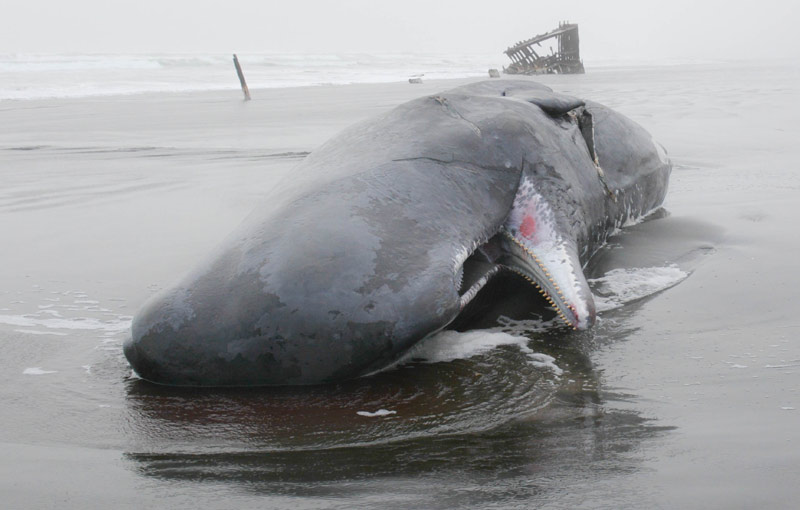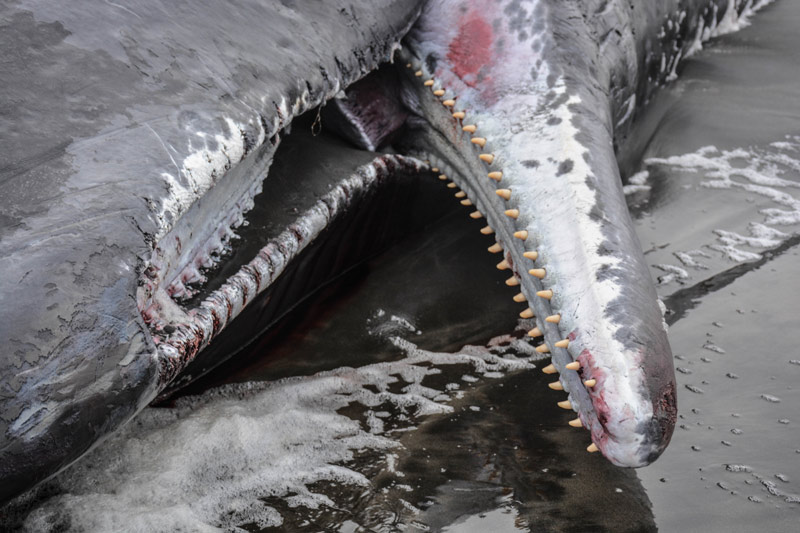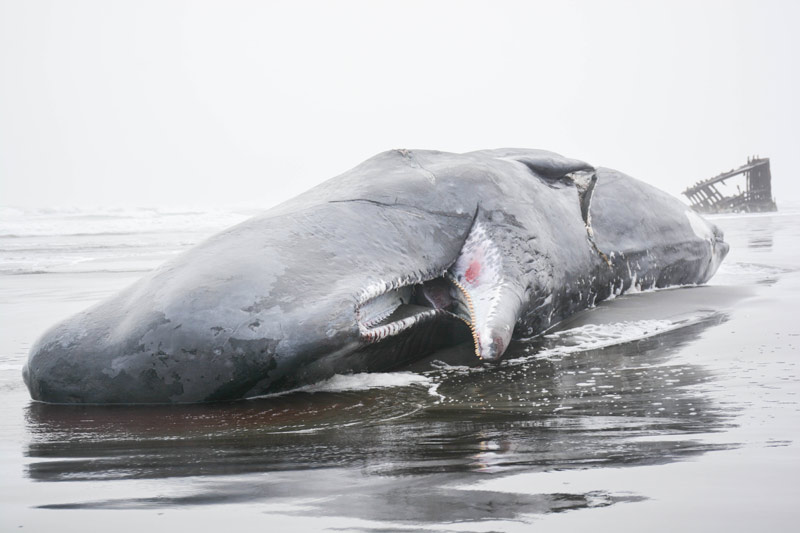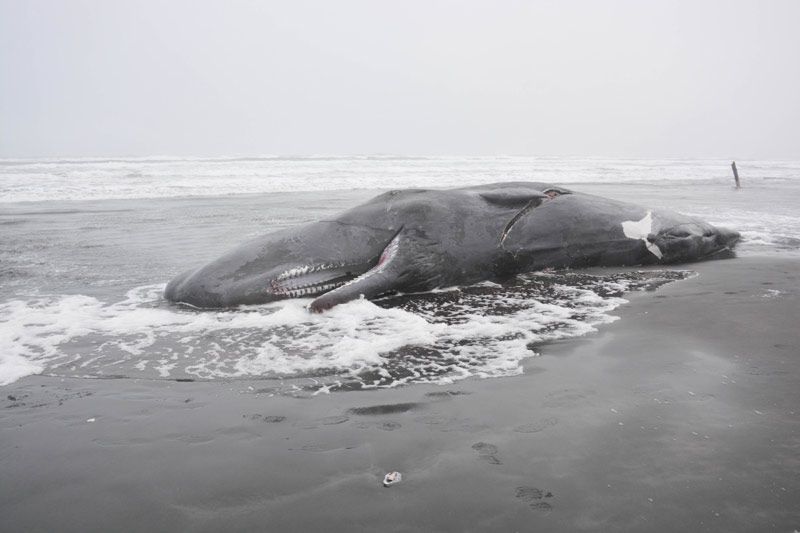Large Sperm Whale Strands on N. Oregon Coast near Iredale Shipwreck; Cause of Death Unknown (Video)
Published 01/15/23 at 6:12 PM
By Oregon Coast Beach Connection staff

(Warrenton, Oregon) – [NOTE: FOR UPDATES ON CAUSE OF DEATH SEE Three Whales Hit Oregon Coast Sands: Causes of Death Released] For what is a rather uncommon sight, this was a bit unusual for the Oregon coastline. A 40-foot sperm washed up at Fort Stevens, right within view of the wreck of the Peter Iredale. Crews from Seaside Aquarium said it was a male that had not been dead for very long. (Photos and video copyright Seaside Aquarium / Tiffany Boothe)
At first it was NOAA (National Oceanic and Atmospheric Administration) fisheries personnel who responded as part of the Marine Mammal Stranding Network, then Seaside Aquarium's Tiffanty Boothe and Keith Chandler.
Chandler told Oregon Coast Beach Connection finding a dead sperm whale on an Oregon beach is rather rare, though they have a sizable population offshore from Oregon and the Washington coast.
“This is only the 5th or 6th one we've dealt with,” he said.
Indeed, Oregon Coast Beach Connection has been covering these incidents since 2007. There were only three reports for the northern half of the coast and south Washington coast: in 2007, 2017 and 2012.

Boothe said the whale was already dead when it washed ashore, in spite of some social media claims that it was still moving.
“That's just because the water was moving it around,” Chandler said.
The whale showed with marks on its body that may or may not reveal much.
“There were a few large gashes on the whale believed to be from a large ship shrike, however, it is unclear if this shrike occurred before or after death,” Boothe said Sunday. “A necropsy will be scheduled later in the week to take a closer look at this. Today, with help from the wonderful staff at state parks, we were able to remove the lower jaw. The jaw was removed so that the teeth remained intact for scientific purposes.”
Chandler said it didn't smell too bad as many whale corpses do.

“It was the freshest sperm whale we've every had,” he said.
Next up is the necropsy, which will done on the beach on Monday. Dalin D'Alessandro from Portland State University's Biology Department will be the scientist working on that. She is also part of the Marine Mammal Stranding Network.
Chandler said these necropsies involve taking samples (such as the organs) for study back at the lab, as well as opening up the creature to see if the wounds happened before or after death. They also look for diseases.
“Male sperm whales can reach nearly 60 feet and weigh well over 40 tons,” Boothe said. “They have been known to live up to 60 years, with males maturing around the age of 50 at a length of approximately 52 feet. They feed on deep water species, such as squid, sharks, skates, and fish.”
Sperm whale populations are still recovering from being near the brink of extinction after so much hunting in the last century. They remain an endangered species.

This is why federal authorities sometimes get involved with these strandings. The 2007 stranding of a sperm whale near Cannon Beach included federal authorities tracking down a man who had taken parts of the whale – a federal crime if it involved an endangered species. Penalties are as much as one year in prison and a $100,000 fine.
Chandler and Boothe wanted to remind everyone to keep clear of the whale and do not touch it.
“Any whale, dolphin, porpoise, or pinniped can spread potential diseases to humans and pets,” Boothe said.
Yesterday afternoon a 40-foot sperm whale washed ashore just south of the Peter Iredale in Fort Steven’s State Park. The whale had been dead for a while before washing ashore. There were a few large gashes on the whale believed to be from a large ship strike, however, it is unclear if this strike occurred before or after death. A necropsy will be scheduled later in the week to take a closer look at this. Today, with help from the wonderful staff at state parks, we were able to remove the lower jaw. The jaw was removed so that the teeth remained intact for scientific purposes. This whale is believed to be a juvenile male. Male sperm whales can reach nearly 60 feet and weigh well over 40 tons. They have been known to live up to 60 years, with males maturing around the age of 50 at a length of approximately 52 feet. They feed on deep water species, such as squid, sharks, skates, and fish. While their population is recovering, sperm whales are still considered endangered. Please remember to look- but do not touch. Any whale, dolphin, porpoise, or pinniped can spread potential diseases to humans and pets.
Posted by Seaside Aquarium on Sunday, January 15, 2023
Dogs are especially vulnerable to getting sick, but not necessarily because their systems have less immunity, but that they're more apt to have a closer contact with them.
“Humans don't usually roll around in it like dogs do,” he said.
Hotels in Seaside - Where to eat - Seaside Maps and Virtual Tours
Cannon Beach Lodging
Nehalem Bay Lodgings
Manzanita Hotels, Lodging
Three Capes Lodging
Pacific City Hotels, Lodging
Lincoln City Lodging
Depoe Bay Lodging
Newport Lodging
Waldport Lodging
Yachats Lodging
Oregon Coast Vacation Rentals
Oregon Coast Lodging Specials
More About Oregon Coast hotels, lodging.....
More About Oregon Coast Restaurants, Dining.....
 Andre' GW Hagestedt is editor, owner and primary photographer / videographer of Oregon Coast Beach Connection, an online publication that sees over 1 million pageviews per month. He is also author of several books about the coast.
Andre' GW Hagestedt is editor, owner and primary photographer / videographer of Oregon Coast Beach Connection, an online publication that sees over 1 million pageviews per month. He is also author of several books about the coast.
LATEST Related Oregon Coast Articles
Late season rules for commercial crabbing now a month earlier. Marine sciences
Freaky Cool Astronomy: Earth Just Reached Its Highest Speed of Year and Close...
A few surprises about winter, including why it's short. Sciences
Slightly Rare: Fin Whale Washes Up on N. Oregon Coast - and They Knew It Was ...
Only 3 others have washed up since 2002; this one near Seaside, Gearhart. Video. Marine sciences
Emergency Work Will Briefly Close Oregon Coast's Astoria-Megler Bridge
Thursday Feb 19 from 9 pm to 6 am you'll have to use another route. Traffic
Some Minor Traffic Issues / Construction for Lincoln City, OR 18B to Oregon C...
Work begins next week in Lincoln City and Willamina / Sheridan
Mussel Harvesting Reopened on South Oregon Coast
It had been closed from Port Orford southward because of biotoxins. Marine sciences
Annual 'Maine' Event Returns to N. Oregon Coast's Seaside Aquarium
February 22 brings the fundraiser to Seaside. Seaside events
S. Oregon Coast Wind Warnings, Waves Up To 23 Feet
Gusts up to 65 and high waves for the weekend from Reedsport to Brookings. Weather
Back to Oregon Coast
Contact Advertise on Oregon Coast Beach Connection
All Content, unless otherwise attributed, copyright Oregon Coast Beach Connection. Unauthorized use or publication is not permitted



















































